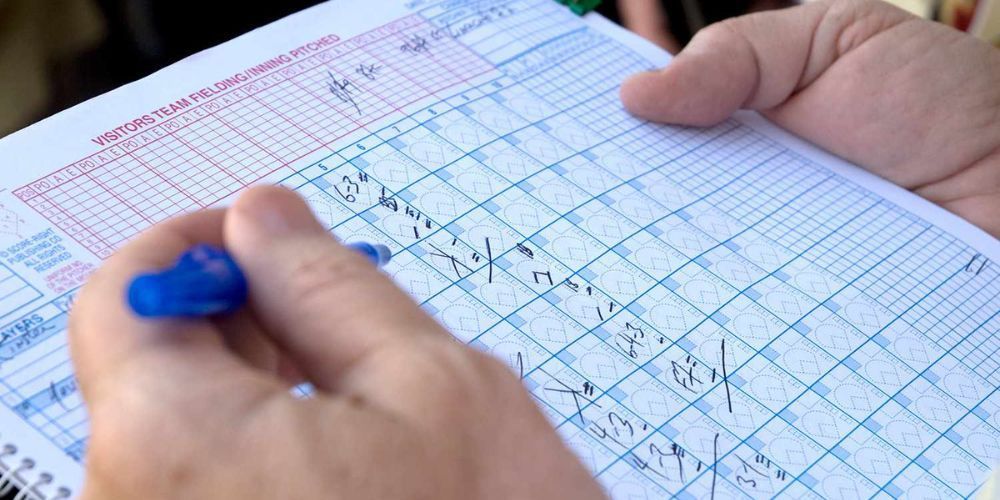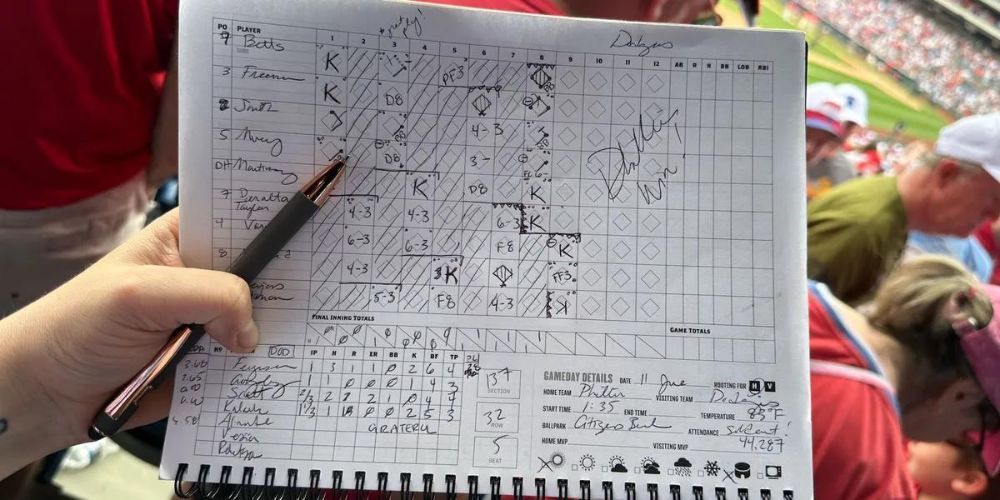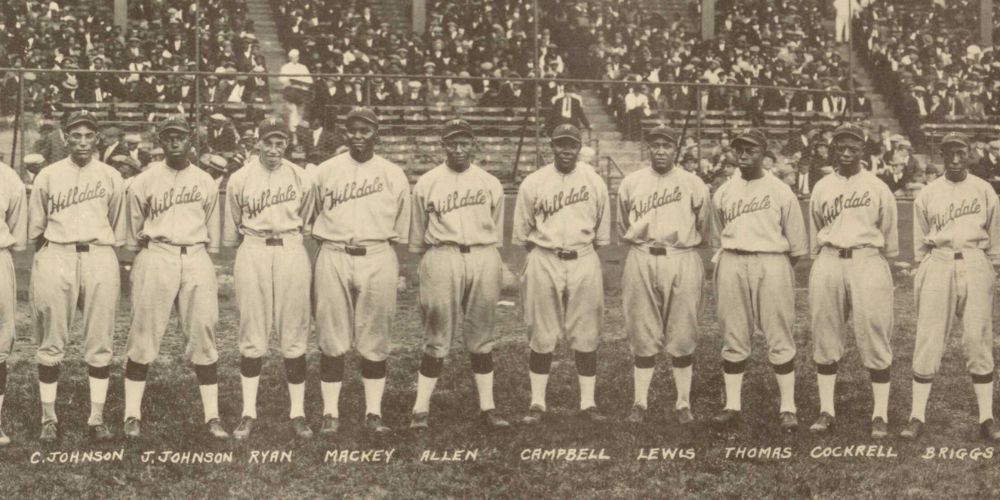Baseball Scorebooks: How to Track and Record Game Stats for Your Team
Keeping track of every hit, run, and out in a Little League game can feel like an impossible task. Especially when you are juggling coaching duties and ensuring every player gets their moment on the field. This often leads to missed plays and flawed stats that can haunt your post-game analysis.
However, with the right baseball scorebook, you can simplify this process significantly. Having researched various tools and techniques extensively—including trying out different scorebooks myself—I found that traditional paper scorebooks still hold an edge with their tactile connection to the game. This might seem surprising in our tech-driven world but navigating these pages can bring clarity and efficiency to your scorekeeping.
The Murray Baseball Scorebook is an excellent option for youth games as it offers a simple layout, includes instructions for less experienced scorekeepers, and provides necessary features without unnecessary information.

The Best Baseball Scorebooks For All Levels
Choosing the best baseball scorebook is crucial as it directly impacts the way game stats are tracked and recorded. When selecting the right scorebook, it's important to consider the specific needs of different levels of play. Let's take a closer look at some of the top options tailored to various levels of baseball.
For Youth Games
When it comes to youth baseball games, simplicity and ease of use are key. The Murray Baseball Scorebook stands out as an excellent choice for its straightforward layout and beginner-friendly instructions. It provides all the necessary boxes without unnecessary clutter, making it ideal for young players just getting started in organized baseball. This scorebook is not only affordable but also ensures that even first-time scorekeepers can easily keep track of game stats without feeling overwhelmed.
For High School and College Games
Moving up to high school and college games, a more comprehensive scorebook is needed to handle the detailed statistics and complexities of these levels of play. The Rawlings Deluxe Edition is highly recommended in these scenarios, offering ample space for recording multiple pitchers and detailed game statistics. Its straightforward layout and various features make it a perfect fit for those looking to record a variety of game metrics accurately.
For Professional Games
Professional games demand a scorebook that can handle a wide range of features and provide comprehensive recording capabilities. For professional settings, Bob Carpenter's Baseball Scorebook is recognized as a top choice due to its balance of features and usability. It offers three specialized versions suitable for broadcasters, fans, and professionals alike, allowing for ample room for notes and inning-by-inning box scores.
For Experienced Scorekeepers
Experienced scorekeepers who require more detailed handling may find The HalfLiner to be their preferred option. This specialized scorebook goes beyond traditional features, accommodating extensive detail tracking with its well-designed layout and additional recording capabilities.
For Those Frequently Traveling
For individuals who are frequently on the go or need something compact and portable, The Traveler scorebook is an excellent choice. Its compact size makes it easy to carry around while still providing the necessary features to keep track of game stats effectively.
Each of these scorebooks brings unique features tailored to specific needs at different levels of play in baseball, ensuring that scorekeepers can choose the most suitable option based on their requirements. Whether it's simplicity for youth games, comprehensive stats tracking for high school and college games, or specialized features for professional and experienced settings, there is a scorebook designed to cater to every need in the world of baseball scorekeeping.
As we've examined diverse baseball scorebooks available for various levels of play, next we'll explore traditional paper scorebooks—a classic method for tracking game stats.
Traditional Paper Scorebooks
Traditional paper scorebooks for baseball hold a unique charm that connects players and fans to the heritage of the sport. In this digital age, the tactile nature of these scorebooks allows for a deeply engaging experience, offering a blend of nostalgia and practicality. Brands like Franklin Sports and Covey have excelled in crafting durable, user-friendly scorebooks, making them an ideal choice for avid baseball enthusiasts.
A notable feature of traditional paper scorebooks is their pre-printed formats, designed specifically for capturing every play with precision. These formats include dedicated sections for recording key statistics such as at-bats, hits, RBIs, and even pitch counts. This ensures that no crucial detail is overlooked during the game, enabling thorough and accurate documentation.
Moreover, the sturdy bindings of these scorebooks ensure long-term use, standing strong against frequent handling and storage. The durability they offer makes them reliable companions throughout an entire baseball season, preserving the recorded data securely without any risk of loss or damage.
One excellent example is the HalfLiner Scorebook , which has gained popularity among baseball enthusiasts for its comprehensive design. This scorebook provides ample space for recording up to 50 games, allowing scorekeepers to maintain a detailed log of each game's progress. With well-defined fields for various statistics, the HalfLiner Scorebook facilitates efficient and organized scorekeeping, ensuring that nothing vital slips through the cracks.
In essence, traditional paper scorebooks uphold the rich tradition and spirit of baseball while providing practical functionality for capturing game stats. Their enduring appeal lies in their ability to offer a personalized touch to scorekeeping, fostering a profound connection between the scorer and the game itself.
As we've unwrapped the timeless allure of traditional paper scorebooks , it's time to explore how modern technology has revolutionized scorekeeping in the digital era.
Digital Scorekeeping Options
In our fast-paced, technology-driven world, using a traditional paper scorebook might feel a bit outdated for some. That's where digital scorekeeping apps come in. These apps offer a whole new level of convenience and efficiency, with features that simplify the tracking process and enhance the overall experience of managing game stats.
Apps like GameChanger and iScore have truly revolutionized the way we keep track of game stats. One of their standout features is the ability to provide real-time updates. Imagine being able to see each play as it happens, without having to wait for post-game updates. This level of immediacy not only adds excitement for followers but also provides invaluable information for coaches and players during the game itself.
Another significant advantage of digital scorekeeping apps is their automated stat calculations. Errors in manual record-keeping can lead to discrepancies in player statistics, affecting player evaluations and team strategies. With these apps, stats are calculated automatically, leaving no room for human errors or miscalculations. This saves time and effort while ensuring accuracy in the recorded data.
Additionally, these apps make sharing game data with team members and fans incredibly easy. Coaches, players, and fans can access game information from anywhere, at any time. This level of accessibility fosters greater engagement and connectivity within the team, creating a sense of unity and camaraderie beyond the boundaries of the field.
Think about it this way: during half-time or breaks between innings, players and coaches can review game stats in real-time and strategize based on current performance trends. This immediate access to comprehensive data gives them an edge in making crucial decisions during the game itself. Furthermore, fans who may not be able to attend games in person can follow along with every play and stay informed about player performances, keeping them connected and engaged with the team even from a distance.
In essence, digital scorekeeping apps offer unparalleled convenience, accuracy, and real-time engagement that enriches the experience for all involved in the game—players, coaches, and fans alike.
Customizing Your Scorebook
Let's talk about personalization. Just like having your own favorite pen or notebook, having a customized scorebook can enhance your experience as a scorekeeper. It's all about making it fit your needs and preferences. Imagine being able to flip open your scorebook and see your team's logo front and center, or having extra fields to include stats that are important to you. That kind of personal touch can add a real sense of ownership and pride to your scorekeeping experience.
When it comes to customization, there are multiple aspects to consider:
Cover Personalization: Many brands offer the option to personalize the cover of your scorebook with your team's colors, logo, or even the names of the players. This not only adds a personal touch but also makes it easier to identify your scorebook among others.
Additional Stat Fields: Customizable scorebooks allow you to include specific fields for stats that are crucial to you or your team's strategy. Whether it's tracking pitch types, batted ball directions, or situational hitting stats, having these tailored fields ensures that you capture the data that matters most.
Color-Coding Systems: Some customizable scorebooks offer color-coding options, allowing you to visually distinguish different types of plays, player performance, or game situations. This can make it easier to interpret and analyze the game data at a glance.
For instance, websites like Covey Scorebooks provide a range of options for customizing your scorebook. Users can select specific formats, binders, and even add team logos or player statistics to make their scorebook truly unique. By tailoring every aspect of the scorebook to their individual needs, users can create a valuable keepsake that reflects their dedication and passion for the game.
Now imagine flipping through your personalized scorebook after the end of the season—your team's journey beautifully documented in a book designed exclusively for you. It becomes more than just a record; it's a reflection of your commitment and love for the game.
Customizing your scorebook isn't just about aesthetics; it's about enhancing functionality and creating a profound connection between you, the book, and the game itself.
Essential Stats to Track
Recording stats during a game provides valuable insights into player performance and team dynamics. Let's start with the essential hitting and pitching statistics.
Hitting Statistics
Hitting stats are crucial indicators of a player's offensive prowess. The key categories for hitters include:
- At-Bats (AB): This is the number of times a player has completed a turn at bat, excluding walks, hit-by-pitches, sacrifices, and catcher's interferences.
- Hits (H): The total number of times a player reaches base because of a batted, fair ball without an error.
- Runs Batted In (RBI): This represents the number of runs the batter has helped score.
- Batting Average (AVG): It measures a hitter's success rate at bat by dividing the total number of hits by the total number of at-bats. For example, if a batter gets 3 hits in 10 at-bats, their batting average is .300.
These stats provide important insights into how effective a player is at getting on base, driving in runs, and their overall effectiveness in contributing to the team's offense. Batting average offers a quick snapshot of the player's ability to make contact with the ball and get hits.
Pitching Statistics
Pitching stats are vital in understanding how well a pitcher is performing. Some key metrics include:
- Strikeouts (K): The number of times a pitcher retires a batter through strikeouts.
- Earned Run Average (ERA): This is calculated by taking the total number of earned runs allowed by a pitcher, multiplying by 9, and then dividing by the total innings pitched.
For pitchers, strikeouts indicate their ability to overpower hitters and prevent them from reaching base. The earned run average offers a measure of how many runs a pitcher allows per complete game.
As the foundation of any scorebook analysis, these statistics provide an invaluable evaluation of players' individual performances and overall team strengths and weaknesses. They also assist in making informed decisions during games and strategizing for future matchups.
Advanced Stats
Additionally, advanced stats can provide deeper insights into player performance and team dynamics:
- Stolen Bases (SB): A measure of how successful base runners are at advancing to the next base.
- Fielding Errors (E): Reflects defensive mistakes made by players.
- On-base Plus Slugging (OPS): Combines on-base percentage (OBP) with slugging percentage (SLG) to offer a comprehensive measure of offensive prowess.
Stolen bases show how fearless or savvy your base runners are; fielding errors highlight areas for improvement in defense, and on-base plus slugging provides an all-around glimpse into a hitter's ability to get on base and hit for power.
By keeping track of these essential stats throughout the game, valuable insights into individual player performances as well as identification areas for improvement within the team as a whole are gained.
Moving forward from tracking essential stats during gameplay, let's shift our focus to extracting key learnings from post-game analysis in order to amplify your team's performance.

Post-game Analysis Tips
Post-game analysis is akin to seeking treasure after a long day of mining. With a wealth of neatly recorded stats, it's the patterns and trends within them that hold the real gems. Think of yourself as Sherlock Holmes, connecting the dots and solving the mystery of your team's performance.
Let's dissect how you can maximize this analysis:
Focus on Key Statistics
It's easy to get overwhelmed with a mountain of numbers, but remember to zero in on the essential stats: batting average, on-base percentage, slugging percentage, fielding percentage, and pitching statistics. These stats paint a clear picture of individual and team performance across different facets of the game.
Visualize Trends
Once armed with these vital stats, visualize them! Utilize tools such as Excel spreadsheets, specialized baseball analysis software, or dedicated scorebook apps to create graphs and charts showcasing player progress over time. This method offers a visual representation of trends that might be challenging to discern when buried beneath piles of numbers.
Let's say you have a spreadsheet illustrating batting averages for each game in the season. Plotting this data into a line graph may reveal that certain players excel against specific pitchers or struggle with a particular type of pitch. This visual depiction simplifies the comprehension of trends and facilitates informed decision-making.
Identify Player Performance Patterns
After visualizing trends, seek out patterns in player performance. Does someone embark on hitting streaks every third game? Does another player consistently excel against left-handed pitchers? These insights could steer lineup decisions or pinpoint areas for individual player training focus.
Use Analysis to Inform Strategy
Coaches frequently employ post-game analysis to shape training sessions and strategize for upcoming games. Identifying specific skills to enhance or weaknesses to address becomes much more attainable with this detailed insight into player performance.
Keep in mind, post-game analysis isn't about pointing fingers or assigning blame; it's about finding ways to improve as a team and individual players.
By leveraging post-game analysis effectively, coaches and teams can precisely pinpoint areas for improvement and capitalize on strengths, transforming insights into actionable plans that drive success on the field.
Specialized Scorebooks for Umpires and Coaches
Umpires and coaches play a crucial role in baseball games, each with specific requirements when it comes to tracking game stats and details. This is where specialized scorebooks come into play. For teams with larger rosters and more detailed needs, specialized scorebooks like the Glover's 9 to 15 Player Scorebook come in handy, offering ample space for recording individual player statistics, lineup cards, and pitch tracking by inning. The ability to track pitching performance by inning is particularly valuable for coaches looking to fine-tune their strategies and assess player capabilities throughout the game.
Moreover, these specialized scorebooks provide coaches with the organization they need to efficiently manage their team's performance, making it easier to identify patterns and trends across multiple games. It's like having a personal playbook tailored to your team's unique dynamics and gameplay.
For umpires, scorebooks such as the UmpScorebook are designed to capture essential game elements from an umpire's perspective, offering dedicated sections for tracking umpire calls, game conditions, and player behavior. This detailed documentation is crucial for making well-informed decisions during and after the game, aiding in post-game analysis and ensuring consistency in officiating standards.
With a comprehensive record of calls made, game conditions, and player behavior, umpires can maintain a consistent level of officiating quality throughout various games, allowing them to stay organized and focused on their primary duty—ensuring fair play and upholding the integrity of the sport.
Accessible, specific information from these specialized scorebooks empowers coaches and umpires alike in making informed decisions. It's about bringing order to what might otherwise be an overwhelming amount of data from games, making it easier to strategize or make calls with confidence.
So whether you're on the sidelines or officiating on the field, having a scorebook tailor-made for your position can make a world of difference in managing game details effectively.
In conclusion, specialized scorebooks provide teams with tailored tools that enhance their ability to track and record crucial game statistics. They offer a personalized approach that allows coaches and umpires to manage data effectively while fulfilling their roles in the game of baseball.
Nature's Playbook
As an Amazon Associate I earn from qualifying purchases.









